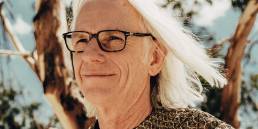It is said that you cannot pray for what you cannot imagine. If this be true and that imagination is the reality of the dreamer, then the dreamers who were once Phillip and Nomazizi Makgalemele lived such powerfully imaginative realities, that the prayers they offered to an unseen God, would transform the position of their family name in ways which would be seen, not only by the communities they were relegated to by the Apartheid government of the then segregated South Africa, but also by the world drawn to the wonders of the new democratic South Africa. The promise of their prayers were revealed in perfectly fashioned timing through their children. One such moment was the crowning of their daughter, Basetsana “Bassie” Kumalo (née Makgalemele) as Miss South Africa (Miss SA) in 1994. She entered the pageant while pursuing a teaching degree through the University of Venda only to end her reign as the first Miss South Africa to have taught those to follow and the world alike, how to leverage a pageant win in impactful ways that would resonate with a broadcasting industry 25 years later still.
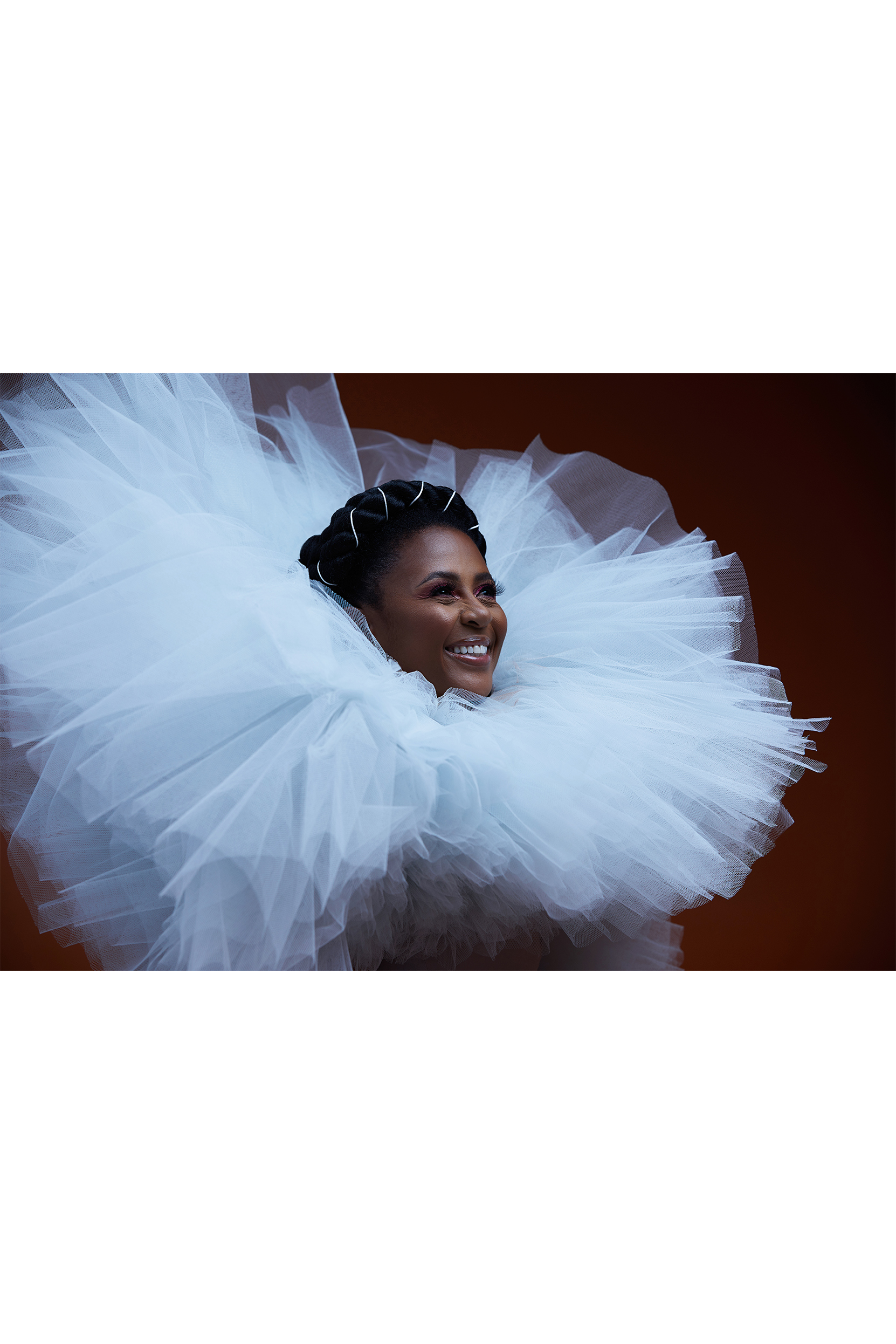

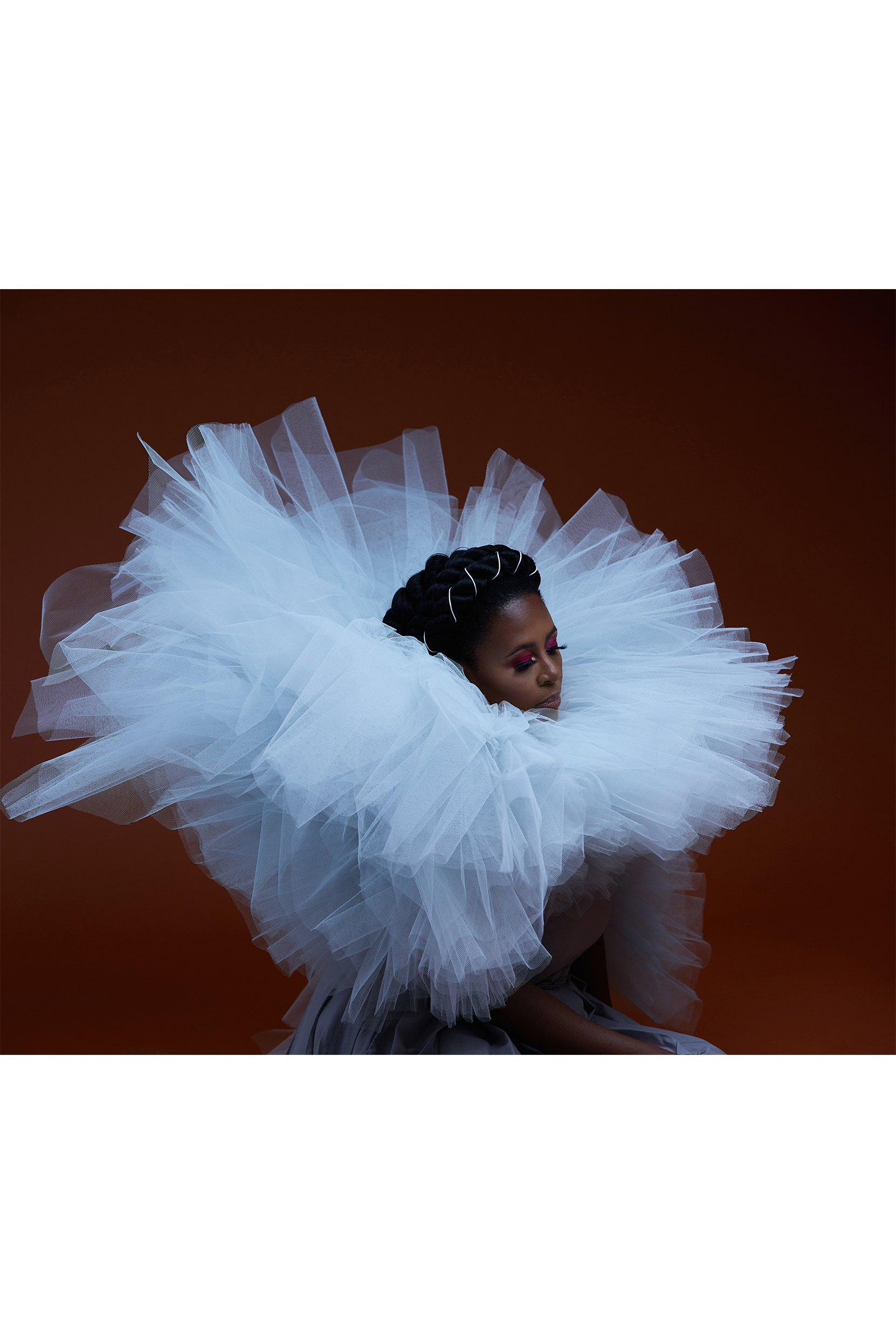
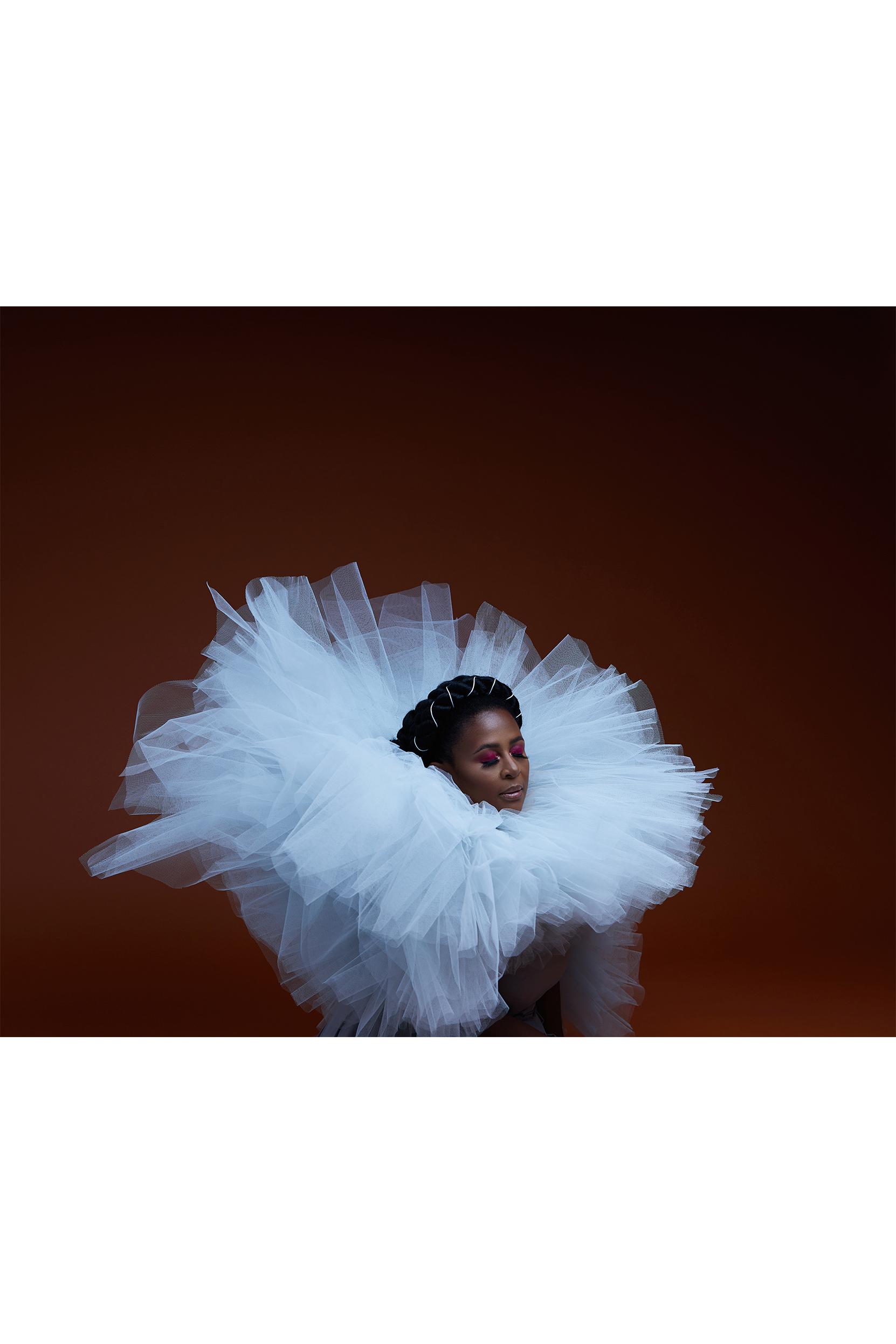



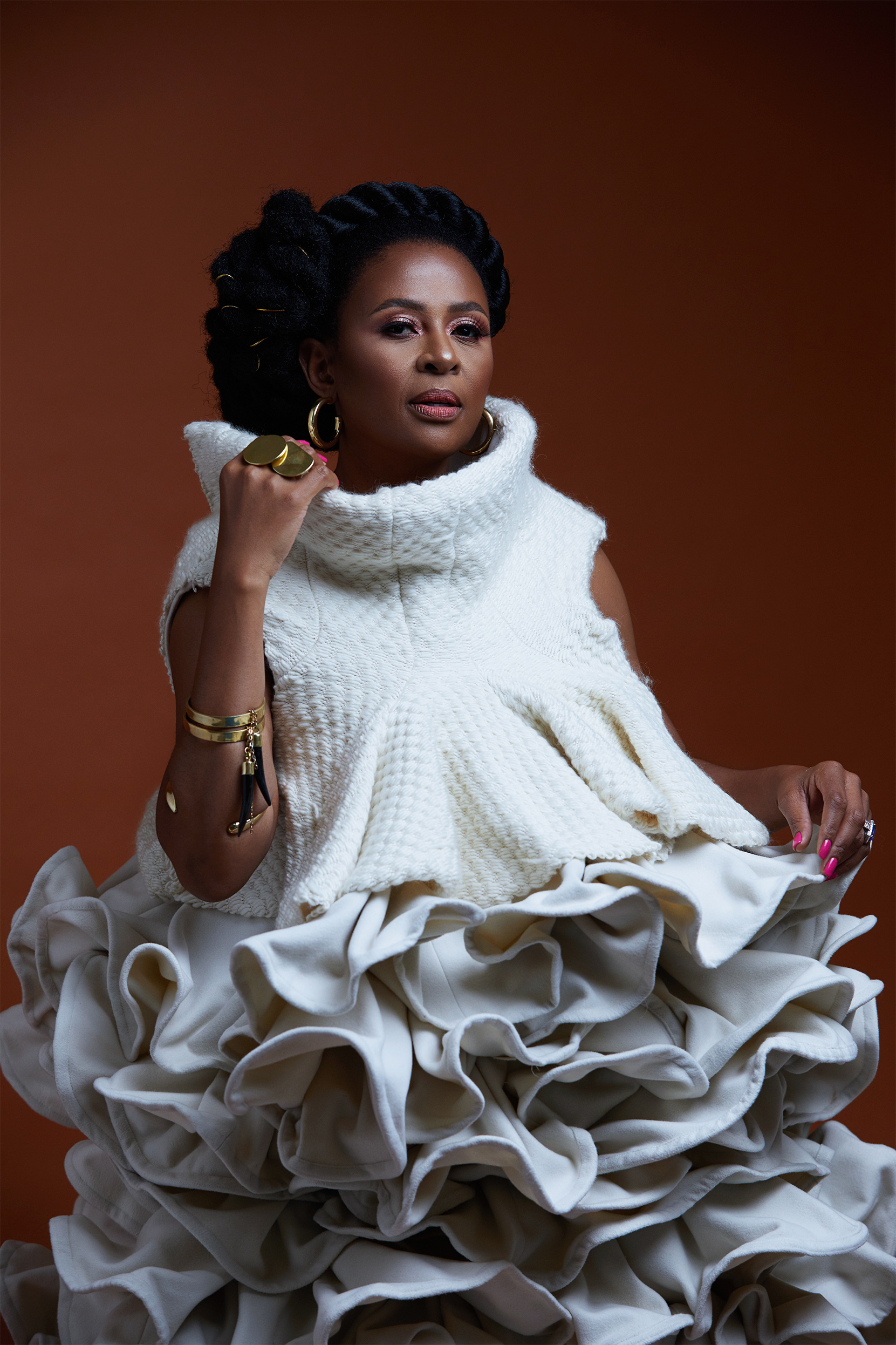
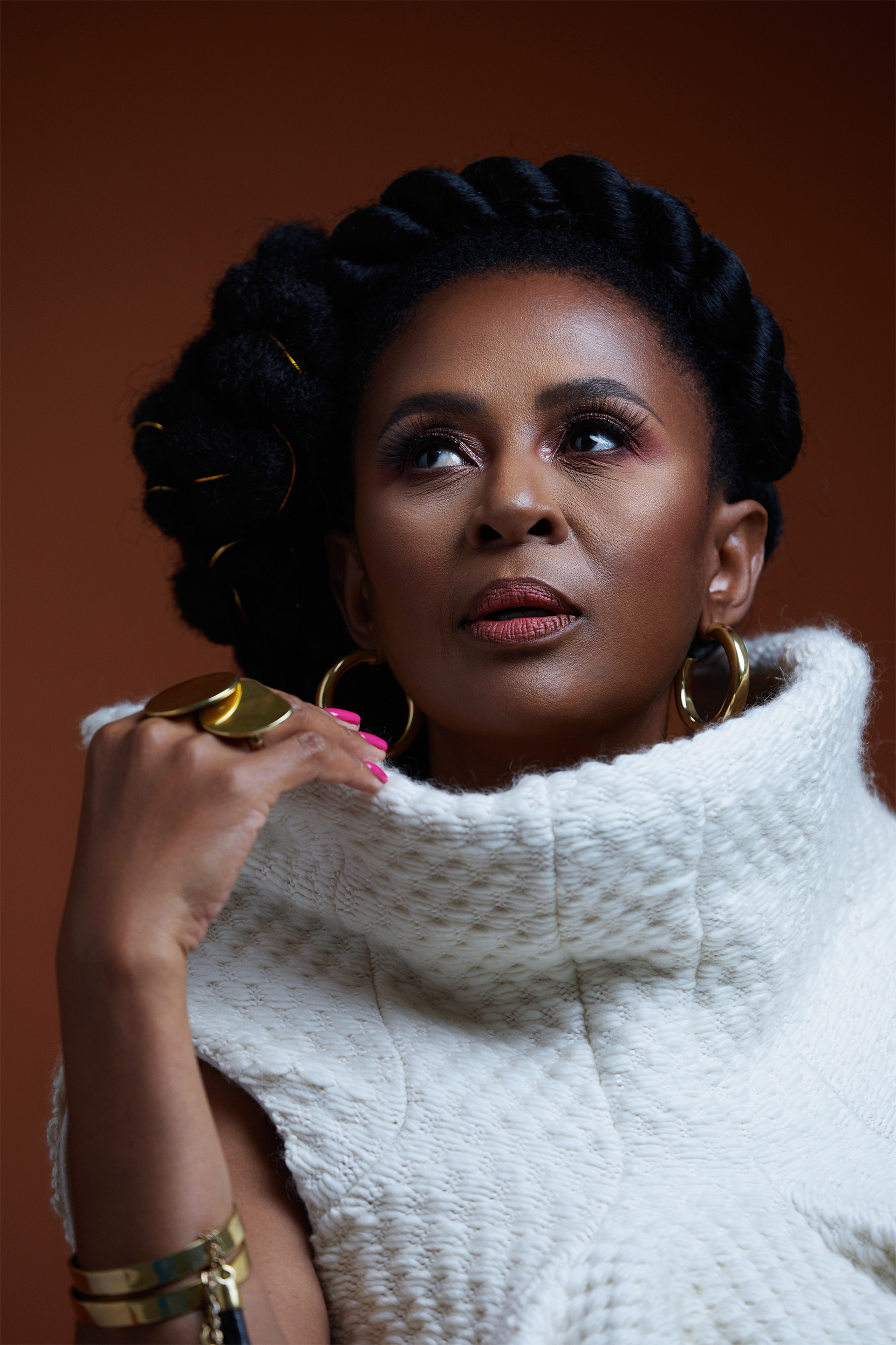

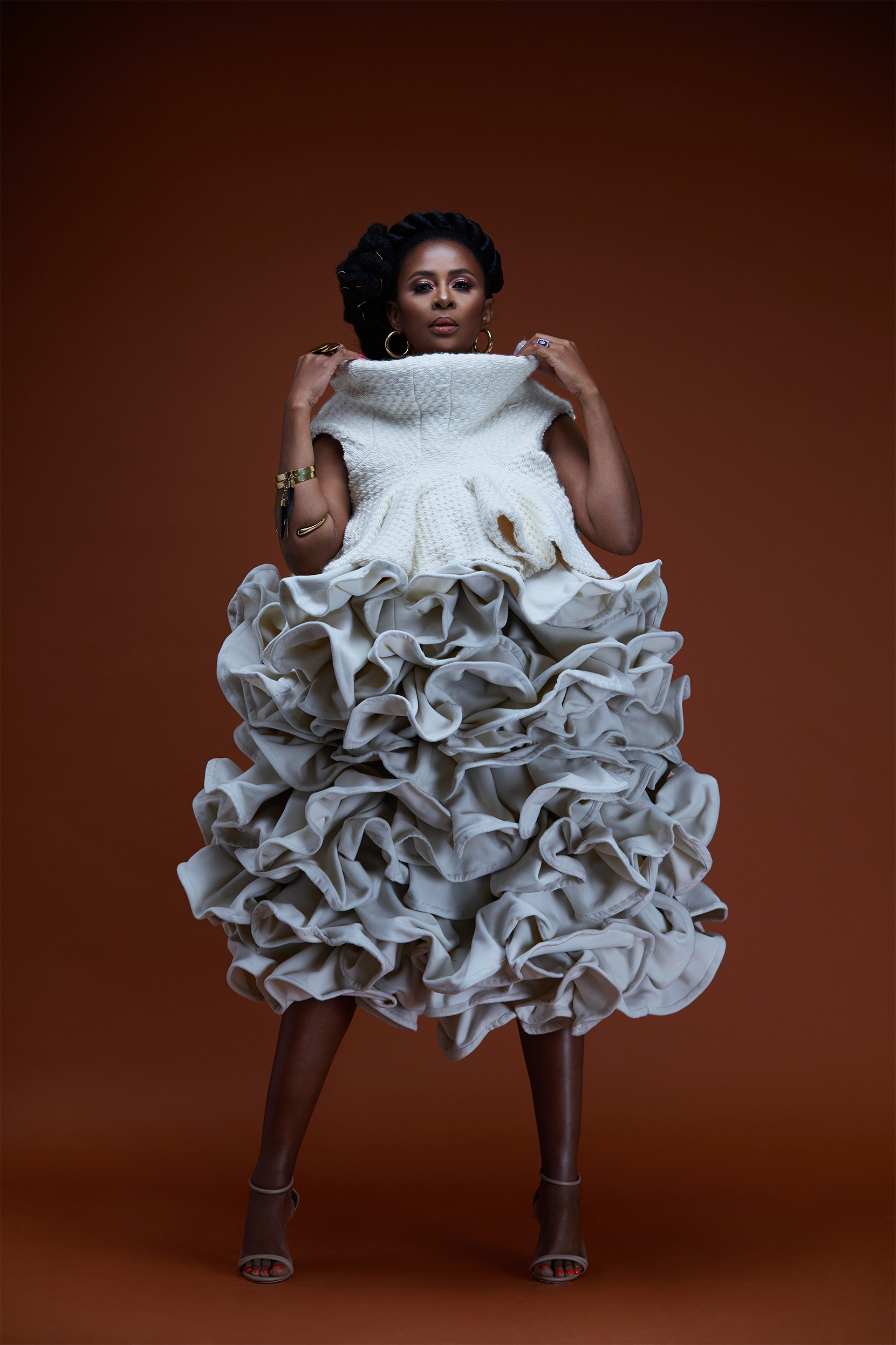
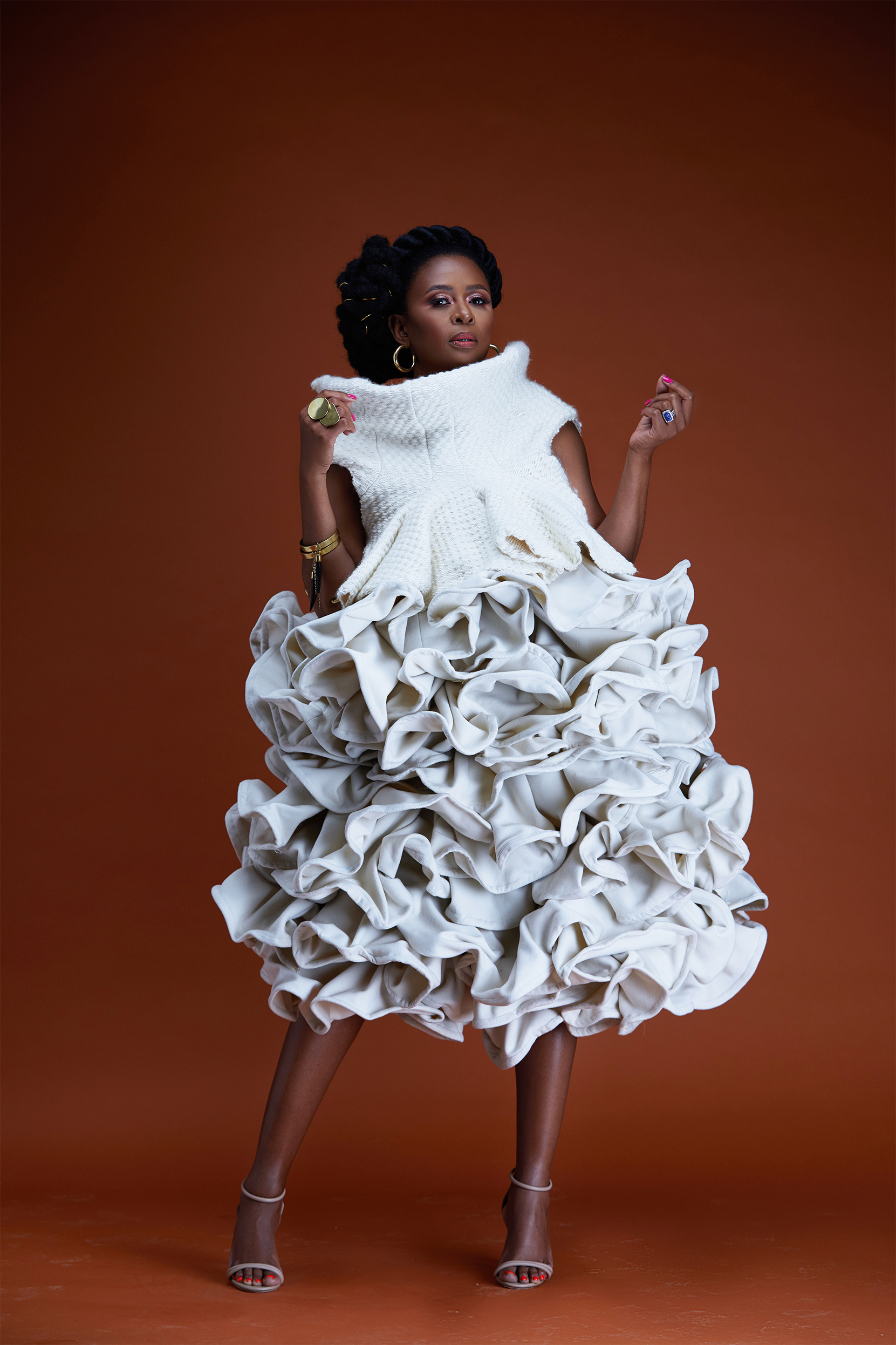
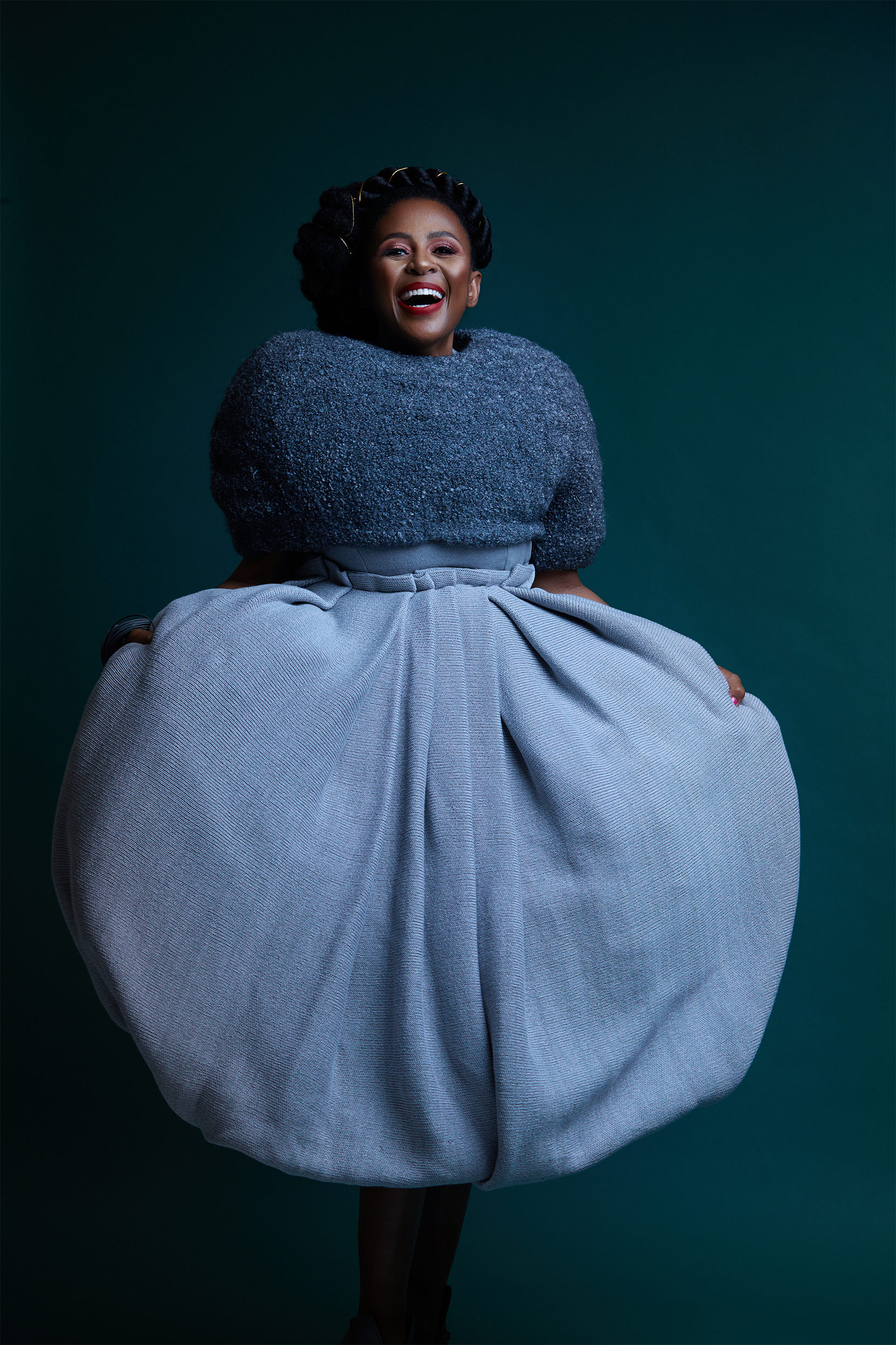
AWE-INSPIRING AMBIENCE
In the wake of the release of her already best-selling memoire, My Journey of Hope (Penguin Random House South Africa), Basetsana Kumalo cleared out her usually back-to-back Monday diary in order to continue sharing key learnings from her awe-inspiring entrepreneurial broadcasting journey. From the moment she walked onto set, the energy of the room rose to meet hers and our team of close to 20 practitioners instantaneously offered her mere presence the brief moment of respectable silence it deserved.
Wearing an African print off-the-shoulder summer dress, that undeniable smile the country fell in love with during her crowning at the Sun City Superbowl 25 years ago disarmed the magnitude of her persona and created a warm and loveable ambience that perfectly aligns with the woman behind that persona – a mother at heart whose children are not only those gifted to her by God in the form of the #Tribe she’s created with fellow entrepreneur husband Romeo Kumalo but also those whose careers she helped birth, as part of her mentorship pool. Moments like these are powerful in that they offer a moment of reflection for all those involved. As thebar. Magazine, what could have brought us to this moment of fortitude as an online publication only a year and 3 months in?
INTENTIONALLY GUIDED
Having read her memoire, the one thing that resonated the most as an answer to this question I had in my mind was intention – Kumalo’s understanding of it, respect for it and steadfast commitment to leading with it in everything she has done. In chapter 8 of her book which is captured within PART II: Dream Realised, she writes “Right from the beginning, I was aware that my reign was only for a year. The important thing was what I was going to do with my life once those twelve months were up. I had always been a firm believer in journaling. In Habakkuk 2:2, the Lord speaks about writing down your vision: ‘Write the vision, and make it plain upon tables, that he may run that readeth it.’ So that is what I did. I was very clear on how I structured my year, I had my short-term goals, my medium-term goals and my long-term goals.”
One can only imagine the magnitude of that moment where she went from being “just” another black girl-child born in the Apartheid regime to becoming the ambassador of the same country that now found itself at a crucial turning point. Considering the fact that part of these goals she wrote of meant that Kumalo would become the first Miss SA to become a television host due to the mentorship and backing of then pageant owner Doreen Morris and a co-producer of that very same predominantly white audience viewed premium lifestyle show, Top Billing, through her business partnership with Patience Stevens, it’s safe to say that Kumalo’s goal setting projected beyond what she would have been ordinarily offered. This naturally averted me to wonder if winning that pageant, which essentially remains the catalyst for every success that followed her name, was an invitation to a seat at the table or merely an invitation to the manor house – a slightly different type of invitation which would then require the recipient to figure out how they would find themselves seated comfortably at the table.
“I could not have scripted winning Miss SA in 1994 better myself” Kumalo says, during our exclusive sit-down, “In understanding the timing of my win, where the country was, where the country was going and the hope and optimism that resided within us in 1994, I understood first of all that this was a moment in time. I had the crown on my head but what remained important was what I was going to make of the crown post the year of my reign, not during it. What was critical was for me to turn this exposure I had into living a dream realized, to earn my place at the table and have the manor house. So, it was a very conscious understanding of what that moment and that season represented. I chose to be conscious in every single decision that I made from 24th September 1994 because that was going to define my future, the woman I would become and the choices I would make. So, it was an invitation to dream big, be audacious, be courageous in pursuit of those dreams and to not be afraid to fail in that process, I was 20 years old – honey I was also conscious about the fact that no one was going to invite me to the table – I was going to have to pull-up a chair and take my seat at the table, unapologetically and unreservedly.”
Kumalo saw the value in the crown beyond the crystals and diamonds – she quickly identified the aggregated effect it had on black communities around the country who identified themselves in her – a far cry from just being perceived as a queen whose beauty was hers alone. Kumalo shared, “You cannot be crowned Miss SA in 1994 and fail to understand the responsibility of it as a young person. I could not squander the opportunity, take it for granted, misuse it and have delusions of grandeur that it was about me – it was about the collective. There was a generation I had the responsibility to impact and to bring along. I come from a generation where it wasn’t the case of the Makgalemele daughter won, it was that we as the community won Miss South Africa. I grew up very quickly – 20 year olds were out clubbing while I had become an ambassador of the country, was presenting on television and started a production company which I had to sell the car I won as a prize from the pageant in order to fund it. I was making different choices from my peers and those choices have brought me here to this journey.”
A REBEL WITH A CAUSE
Across the shores, sits another formidable woman in the industry of film and television whose no stranger to firsts like Kumalo. Viola Davis, who being the recipient of an Academy Award, an Emmy Award and two Tony Awards, is the first black actress to achieve the Triple Crown of Acting. Davis, famously once said, “Opportunity separates black women from everybody else.” Being intrigued by the underlying reasons that drove Kumalo to leverage the Miss SA opportunity she said, “I fully understand where I come from. I’m a child of the 70’s and the apartheid regime had relegated our generation to being rebels who wouldn’t amount to anything. I then decided that I was going to become a rebel with a cause, I’m going to break this mould, I’m going to challenge this system and the status quo of what black people and what a black girl child could achieve. So, when the opportunity presented itself, I was cognisant of the fact that I could not squander it and that it would be an inditement if I did. So, I had to make sure that on a daily basis, I understood the impact that my choices were going to make and have for generations to come. We were never allowed to enter Miss South Africa as Black people before 1987 and so, in 1993, Jacqui Mofokeng trailblazed this for us. I come into the fray in 1994 and it was incumbent upon me to do the right thing. Even starting Tswelopele Productions at the time made sense. Television was intrigued by the fact that in 1994 we were on the world stage, I was interviewed by world media and recognized the exposure and was keen to know how I could leverage from that. As opposed to being caught up by being in front of the camera, I wanted to understand the business of television. Little did I know at that time, with my partner Patience Stevens, that we were going to create a structure or an environment that after 25 years, it would become a company that would have employed hundreds of people and would have put people’s children through university and would have created generational leaders. Television is a powerful tool so the birth of Tswelopele productions was going to create a movement where young people could see themselves in front as well as behind the camera and by so doing change lives, inspire, entertain and educate.”
To lead with a clear intention consciously requires a level of courage that leaves no room for second-guessing of one’s own convictions. As the story that leads up to the creation of Kumalo’s name as a household brand, it became apparent that for Kumalo, the courage she’s had driving this intentional approach, has stemmed from her mother – the primary matriarchal figure in her life whose soul breathes through the pages of her book. In reading the prologue for her book on camera, Kumalo became emotional as her focus turned to the section about her parents, in particular her mother, or “Moeder” as her and her siblings affectionately referred to her as. In reflecting on the impact her mother had on her, Kumalo says, “I was raised by a formidable matriarch. Even as a child, I was very conscious of who this woman is and what she represented and I understood her struggles because my mother used to share everything with us – being forcibly removed from Sophiatown and even her struggles to conceive us as she had us later in her life. So I was raised by somebody who represented all that I could become, a tangible life-coach that worked so hard. My mother was very courageous, fearless and relentless.”
Kumalo states quite emphatically, “For me the word HOPE means Hold On Pain Ends so when the going got tough, even when my parents’ marriage was challenged, my mother just never gave up. And so, that’s the only frame of reference that I have – it’s from my mother, I’m my mother’s child…I made the choice to enter the pageant after she left me no option but to do so because my mother didn’t suffer fools, she used to say “jump” and she would say “how high”. She was the first black woman to go to brick-laying school so having that primary role-model, even though I am an introvert, ensured that I was a confident child because I was affirmed not only by my mother but even by my father as well. So, I find myself in the position of being able to tick the boxes of firsts during that period of my reign because what I knew I had to do was to show up for the choices that I make, to own them and to use them.”
THE BROADCASTING BUG
Use them she did. Through the various business ventures she’s entered into that have ranged from construction & mining, travel & tourism, cosmetics & eye-wear ranges and ambassadorships long before the announcement of them was one of the primary causes of an Instagram frenzy that they are today, none has continued to propel her name in the media such as that of the co-production work she has done through Tswelopele Productions and Connect TV. For someone who’s recently added to her portfolio business interests in a 4IR and technology driven venture with her husband, it’s hard to believe that her days in production began during the days where episodes where delivered to client/channel by hand and location sets abroad for Top Billing meant that as the presenter of the show, you were your own glam squad!
The irony of her not-so-glamorous beginning in television is that it was an experience on the back-foot of hosting the premier lifestyle show South Africa had ever seen. Who doesn’t remember the famed walking link down the staircase of a dream house that accompanied the phrase, “Good evening and welcome to Top Billing”. In the local television wall of fame lexicon of phrases that will forever remain a historic imprint in our industry’s historical identity, much-like Noxolo Grootboom’s “Ndinithanda nonke emakhaya”. Let’s not forget the double-breasted jacket suit, 90’s perm and Revlon glam way that Kumalo often did it in, it remains a dream phrase that many in the industry wish too that they had the privilege of one day saying. Before magazines had the opportunity to do it, Top Billing defined what an aspirational lifestyle was and was able to do that for the majority demographic population of the country with Kumalo becoming the first black host of the show during her reign.
The quality of the names that comprise the list of the “many” who were aiming for the privilege to utter Kumalo’s words is testament to the quantifying effect that that one production had on an industry that similar to the country it produced content for, was reimagining what it stood for. Names such as Ursula Chikane (née Stapelfeldt), Neil McCarthy, Michelle Garforth Venter, Bonang Matheba, Janez Vermeiren, Nico Panagiotopoulos, Masego “Maps” Maponyane, Jonathan Boyten-Lee, Harmony Katulondi, Lorna Maseko, Fezile Mkhize, Ryle de Morny, Jeannie D, Ayanda Thabethe and the late Simba Mhere, just to name a few. All would all tick ‘becoming a Top Billing presenter’ off of their bucket list and too, become residents in our local hallmark of fame. This however is not forgetting those who took a page out of Kumalo’s book and used the show as a career leveraging tool post a pageant win – names such as ex Miss SA 2001, Jo-Ann Strauss and ex Mr. SA 1996, Dr Michael Mol.
From shooting on location, be in locally or abroad, to showcasing celebrity weddings in a way in which they had never been done before in South Africa and not forgetting, the home tours before any home make-over reality show and even channel existed – it’s still safe to day that to have one’s home described by guests as “So Top Billing” is still a stamp of approval. The impact which that one show made to the television industry as a whole today has been pioneering at the very least. In reflecting on the magic which the show consistently created, Kumalo says, “Top Billing contributed to excellence, doing things unconventionally and breaking the mold. As an iconic lifestyle show, for the past 25 years, Top Billing showcased possibility, especially career-related possibilities for black people who were not exposed to careers such as architecture or landscape artistry. Where we come from, our choices were confined to nurse, doctor, teacher or policeman. So, I think it opened a whole universe, not only to individuals but also to the industry in terms of the quality of production that we as South Africans could produce and export.”
Together with Stevens, Kumalo sought to build their production company to produce similar lifestyle content for different audience groups through shows that reflected various content touchpoints such as travel & tourism through Top Travel and the highly supported Afrikaans language medium audience programming through Pasella, to name a few. The Top Billing magazine was also a first in the country for any lifestyle show and production company. The ending of the show this year with an exclusive look into the intimate private family life of the Kumalo #Tribe was an unexpected treat for lifetime viewers of the show who were yet to see the life which the Kumalo’s had managed to create for themselves in hindsight of the humble but loving beginnings she emerged from. The final episode which aired on the 19th October 2019 marked the end of an era of lifestyle programming which had showcased to the country what ‘the best of the good life’ really meant, looked like and required in order to achieve. While reflecting on its ending, Kumalo says, “The media wanted to sensationalise the ending of the show but I think that after 25 years, it had done its job by changing the narrative about production potential and pioneering in this country. I think we were ahead of our time. So to have passed on the baton and seen up-coming productions is fulfilling. Subsequently, the learnings from the University of Top Billing, have taught me how meaningful it was producing that show.”
THE CONNECT CULTURE
Parallel to her work at Tswelopele which focused primarily on traditional television programming, Kumalo also went on to create television which would create reality television for an audience which was familiar with the format of programming primarily from an international perspective but was yet to see it unfold through shows which unashamedly yet respectfully reflected the authentic local experience for the majority of black South Africans.
Kumalo’s other venture in television production, Connect TV, sought to set the bar for what locally relevant and engaging reality television programming was. The culture of second screening, leveraged by Black Twitter, stands out as the foremost phenomenon of Kumalo’s famed Sunday night tv-viewing, whether at home or through an Our Perfect Wedding (OPW) hashtag or both, Connect TV has created a formula that owns audiences’ attention on a Sunday evening at a time where we thought that appointment viewing was long-gone. Let’s be honest, watching a re-run of one of their productions is just not the same when part of the viewing pleasure is to engage with the Twitter commentary and subsequent memes while the show is on air. Kumalo’s view on her contribution to this format of television is quite telling of the power of taking a chance at something new and being taken aback by the outcomes which you yourself could have never expected. She says, “Not in my wildest dreams did I think that I would go from standing on a bucket to reach the height of the table in my parents’ sandwich making business assembly line to coming to the point of having the greatest privilege to create unique content available in different genres. Little did I know that when I went into the reality space, that it would blow up to the extent which it had. To be able to cut across entertainment reality to emotainment then go into scripted now and to see how one can diversify through content creation and production and impact the way in which people view themselves has been very fulfilling. With OPW for example, our people want to see themselves and the celebration of love – not everybody can have a Top Billing wedding.”
Over and above the captive audiences so many of us have become a part of, what one can appreciate further is the intentional approach with which Kumalo has approached this business with. This is reflected most prominently in the seamless synergy in the narrative of these emotainment or “social intervention” reality shows – a term she uses to describe them in her memoire. During our conversation, she indulges me with her thinking regarding the choice of programming by saying, “People have to date, so we offer them Date My Family; that dating could easily lead to marriage, which OPW presents itself as an opportunity for; then you may have problems in your marriage so somebody has to step in honey, hence Please Step In; then there may be DNA issues with the children, hence uTatakho. So when I create some of these properties, it’s really a full understanding of how we live, how we evolve as people through the stages of our lives and we try to capture these as authentically and as honestly as possible.”
AUTHENTICALLY AUTOGRAPHED
There is something to be said about Kumalo’s level of authenticity which she together with her Connect team has been able to maintain as a content principle. At the very least though and ironically so, authenticity comes natural to her. Danish philosopher, theologian and poet Søren Aabye Kierkegaard once said that “Hope is passion for what is possible”. Kierkegaard is considered to be the first existentialist philosophers which is a branch of philosophy that focuses on the construct of freedom with authenticity being the primary virtue of focus.
Many existentialist writers consider this ideal of authentic existence to be important. To them, authentic existence involves the idea that one has to “create oneself” and then live in accordance with this self. What is meant by authenticity is that in acting, one should act as oneself and that authentic act is one that is in accordance with one’s freedom. That sense of freedom which Kumalo became the face of for South Africa 25 years ago, is one which she’s used to authentically autograph her presence in anything. This freedom though, has come with it a sense of responsibility on her part to fiercely protect the quality of the energy she allows to surround herself with as she says, “I’m very pedantic about what I allow into my heart, soul and my consciousness because I know that that is what I will end up giving to the world. There is grace that abides and there is power in grace. I’m currently reading The Book of Joy (Cornerstone), co-authored by The Dalai Lama and uTata, Archbishop Emeritus Desmond Tutu. In this book, these wise men say that suffering and life challenges are inevitable. However, it’s how we choose to respond to the challenges, that makes all the difference. I choose every day that I’m going to show up in grace, in my truth, in my fun – ndithanda ukujayiva (I love to dance), nana what you see is what you get. I’m not on rehearsal ku le life (during this lifetime) because asoze ndithi hayi man, akhange ndiyigqibe, khawuthi, one more time (I won’t be given another opportunity to live this life). I’m fully present in life – I own my mistakes, I love much and as I say in my book, I forgive quickly. There is just no time for toxicity in your being.”
FAITH FEULED
To have made a conscious decision to avoid toxicity is testament to the strength of her spirit, especially during the tests and difficulties Kumalo has faced which have been at the very least, things made for a film script and not reality format for anyone’s real life. From enduring seven miscarriages, defaming attacks on her marriage and the loss of both her parents in the midst of all of this, Kumalo’s resilient nature to hold on to that very definition of hope which she carries, gives an indication that this is a woman who is guided by something deeper. Kumalo confidently says, “I am a child of faith. Even during the darkest hour of my life, I always knew that the sun would shine again and that I just needed to stay the course and cry through the pain, not escape it, process it so that I could stand in the sun tomorrow and not be bitter and angry. My pastor (Ray McCauley of Rhema Bible Church) always says unforgiveness is almost like drinking poison and expecting somebody else to die from it.” In the section of the book which includes much deserved praise for it from the likes of humanitarian Graça Machel DBE and producer and mentor to Kumalo, Doreen Morris to name a few, Kumalo’s long-time pastor McCauley says “Bassie is an inspiration to women. I often ask my congregation: ‘Do you wear Jesus well? Bassie definitely does.”
Arriving at this point of carrying her grace in a Christ-like manner has mean that Kumalo has always had to see the value in the darkness in that it always makes the contrast, being the light, more visible. Poet Rumi says that when the world pushes you to your knees, you’re in the perfect position to pray. At every instant when she was pushed to her knees, indeed Kumalo saw the gift in the prayer which the tests offered. Similarly so, Kumalo’s sense of hope resonates with author and “soldier of love” Marianne Williamson who in her book, A Year of Miracles, Daily Devotions and Reflections (Harper One), a favourite of Kumalo’s which she carried with her even to the photoshoot, Williamson says, “A sun that is eclipsed is not a sun forever hidden.”
This consistent ability of Kumalo’s to see the positive contrast in every test is a trait akin to world leaders alike like her, such as international author, philanthropist and life coach Tony Robins. In his Netflix documentary, I Am Not Your Guru, Robbins speaks of the power in always recognising the contrast by saying, “If you’re going to blame people for all the bad, blame them for all the good as well. You have to blame consciously and effectively. If you’re going to give them credit for everything that’s wrong then you need to give them credit for everything that’s great. Don’t stop blaming but blame elegantly, intelligently and effectively. Blame at the level of your soul, not at the level of your head because life is not so simple in black and white. My mother beat me. She loved me. She was freaked out I was going to leave as I was her source of everything. However, I blame her for all the beauty in my life. I blame her for the woman I have in my life – I cherish my wife because I know what the opposite is. I blame my mother for my capacity to feel and care. I blame her for my insatiable hunger to end suffering for any human I can because I suffered a ton. If she had been the mother I wanted, I would not be the man I am proud to be. That’s the truth. Our biggest problem is that we think we shouldn’t have them. Problems are what make us grow, sculpt our soul, become more. Life is happening for us not to us. The problems are the gift.”
In one of the heartfelt forewords of the memoire, Dr Phumzile Mlambo-Ngcuka says of Kumalo, “This has to be one of the essential takeaways from the book: the importance of winning and losing gracefully.” Throughout the duration of the photoshoot, Kumalo gifted us with her grace in a manner truly authentic to herself. From requesting Praise & Worship music in the background which she gracefully sang and danced along to, to being open to each and every idea the styling and glam-squad team had, Kumalo’s authentically free spirit is a testament to the strengthening power of grace a – grace born as a result of hardships that Kumalo chose to use in order to strengthen her spirit and not harden her soul.
THE NEXT 25
Today, the soul of Kumalo finds itself perfectly perched to give a sound perspective on the future of our industry and her plans in it thereof. “I’m evolving into my highest calling” she says. “I’m a teacher. I just didn’t finish the last year of my degree because of the Miss South Africa pageant, so I finished with other majors later on such as politics. I still see myself as a teacher but not in a conventional classroom with chalk in hand. God has got such an interesting sense of humour because he given me television, media and broadcasting as my bigger classroom. So, the teacher in me will always present herself but it’s up to the pupil to shout for the lesson. So, in understanding that and god-willing I will have another 45 years, I hope that I can continue to show up in my truth and by doing so, I hope that I can illuminate how it’s done and show others how they too can show up in the their own truth, gift and calling. In terms of the future of television, I believe that reality is here to stay for a while. I’d like to see more young people telling their own stories and reflecting on our history. Our millennials don’t necessarily have a context of the type of South Africa I grew up in, so I would like to see a lot more of those stories being told in a refreshing, beautifully shot and informative way. I look forward to seeing that content from your generation. I want a Bontle ba Morena (Kumalo’s 5 year old daughter) to consume this content and understand where she comes from. Only when we know where we come from are we able to grasp where we need to go decisively. Through the advent of the likes of Netflix and Showmax, we need to create content which will live on those platforms as well. As a content specialist, that excites me so much.”
In her memoire Kumalo reminisces on a moment when she interviewed media mogul and philanthropist Oprah Winfrey who gifted children during her Christmas Kindness programme in collaboration with global humanitarian icon Nelson Mandela. Kumalo asked Winfrey about the gift packs she arranged for each of the children who would be recipients to which she responded, “I put a mirror in each of those packs because I wanted each child to look into their own eyes and see who they are and the potential of what they can become.”
In asking this entrepreneur, pioneer, philanthropist, mentor-to-many, mother, sister, daughter and wife if she was satisfied with what the mirror reflected back after these 25 years in broadcasting, she said with a calm and quite resolute confidence, “I like so many things about this woman that sits in front of you today and I think that I’ve done my parents proud, I think I have done South African’s proud. I think I have done women proud. I think I have done the girl-child proud and if I had to do it all again and go through all the experiences which I have, I wouldn’t change a thing, I wouldn’t take away the pain, the depression or the hypocritical friendships. I wouldn’t take away anything from my past 45 years because it’s made this woman, this whole being. Very flawed, imperfect in her perfections yet perfect in her imperfections, that’s who she is.”
Our conversation closed with an exchange of sincerest blessings, followed by many from our team requesting an image with Kumalo to capture their portion of what the magnitude of this moment in time meant for our publication – an affirmation of the highest order.
Credits:
Editor-in-Chief: @foreveronke
Video Direction: @creative_senzo & @keso112
DOP: @ryan_uys
Editor: @sbusiso_ndulula
Cam Ops: @zuma_sbu
Cam Ops: @stichxsmb
Colour: @kaylandela
Sound: #MandlaZula
Photographer: @jefflovesphotography
Photographer’s Assistant: @evryday_matters
Make-Up: @bk_makeupartist
Hair: @iambomzi
Stylist: @karinorzol
Wardrobe: @lunarlifestyle
thebar. Magazine
thebar. is an online magazine, concerned (read: obsessed)
with the local and international film industries.
Our purpose is to elevate these industries and their leaders
by showcasing high quality, breakthrough content which
elicits a strong response from those working inside
the industry and outside it.
Related Posts
30th Oct 2018
The multifaceted man of God: Diving to the core of Muzi Mthabela
The name Muzi Mthabela comes with many…
28th Aug 2018
FROM THE EDITOR’S DESK: Living water and the celebration of living memory
This, our first issue of thebar.…

